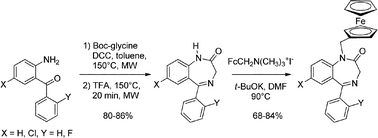 Malaria, caused by single cell protozoon parasites of the Plasmodium species, is a tropical disease causing almost three million deaths every year. The alarming spread of drug resistance and limited number of effective drugs now available underline how important it is to discover new antiplasmodial compounds.
Malaria, caused by single cell protozoon parasites of the Plasmodium species, is a tropical disease causing almost three million deaths every year. The alarming spread of drug resistance and limited number of effective drugs now available underline how important it is to discover new antiplasmodial compounds.
Combining both organometallic and bioorganic characters of molecules into one bio-structure is currently an attractive approach to cancer and malarial therapeutics.
The idea of Pelinsky et al. (University of Lille, France) of “metallo”-derivatising benzodiazepines in a search for new antiplasmodial drugs have led to development of the original synthetic method to prepare new ferrocenyl derivatives of benzodiazepines.
This one-pot procedure using microwave-assisted irradiation allowed preparation of novel ferrocenyl 1,4-benzodiazepin-2-ones in significantly short reaction time and in higher yields compared to the conventional synthetic methods. In collaboration with other French researchers, their antiplasmodial and antiproliferative activities were also investigated.
One-pot microwave-assisted synthesis and antimalarial activity of ferrocenyl benzodiazepines; Gabin Mwande-Maguene, Jouda Jakhlal, Jean-Bernard Lekana-Douki, Elisabeth Mouray, Till Bousquet, Sylvain Pellegrini, Philippe Grellier, Fousseyni Samba Toure Ndouo, Jacques Lebibi and Lydie Pelinski; New J. Chem., 2011, Advance Article; DOI: 10.1039/C1NJ20551J, Letter
Interested to know more? Why not read by accessing the full article now! This “Hot article” will be FREE to access for a period of 4 weeks.










